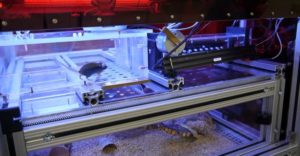May 16, 2019
In the Journal of Neuroscience Methods, Bastijn van den Boom and colleagues have shared their ‘how-to’ instructions for implementing behavioral classification with JAABA, featuring bonsai and motr!
In honor of our 100th post on OpenBehavior, we wanted to feature a project that exemplifies how multiple open-source projects can be implemented to address a common theme in behavioral neuroscience: tracking and classifying complex behaviors! The protocol from Van den Boom et al. implements JAABA, an open-source machine learning based behavior detection system; motr, an open-source mouse trajectory tracking software; and bonsai, an open-source system capable of streaming and recording video. Together they use these tools to process videos of mice performing grooming behaviors in a variety of behavioral setups.
They then compare multiple tools for analyzing grooming behavior sequences in both wild-type and genetic knockout mice with a tendency to over groom. The JAABA trained classifier outperforms the commercially available behavior analysis software and more closely aligns with manual analysis of behavior by expert observers. This offers a novel, cost-effective and easy to use method for assessing grooming behavior in mice comparable to that of an expert observer, with the efficient advantage of being automatic. How to instructions for how to train your own JAABA classifier can be found in their paper!
Read more in their publication here!

